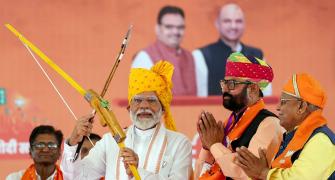Imagine landing at the airport of a booming metropolis only to step off the plane and feel you've touched down 40 years back in time. Roll your luggage outside the cramped airport and you face the seedy hustle of thin guys offering taxi rides in sedans that have looked the same since the 1950s.
Roads seem to have been built then, too. The acrid smell of pollution hangs heavy in the warm night air as you shoo away some of the world's most persistent flies.
All part of 'Incredible India,' as marketers call it -- whether you land, for example, in booming Bangalore or the capital, New Delhi, or Mumbai, formerly Bombay.
To focus on that is to be surprised that India is now one of the world's fastest-growing travel markets--in both directions. Revenue from foreigners traveling to India is expected to reach $6 billion this year and to grow to $24 billion by 2015, according to the World Travel & Tourism Council, which held its annual summit in New Delhi this year.
Indians traveling both in India and abroad are expected to spend $25 billion this year and $63 billion by 2015. So both the roads and airports in India will soon be busier.
India touts its exotic sites, but for now it's corporate rather than leisure travel that's booming: "The global businesspeople without question are coming to China and India," says Marilyn Carlson Nelson, chief executive of the Carlson Cos., which not only has Radisson hotels but also the T.G.I. Friday's restaurants and Carlson Wagonlit Travel agency, a business travel leader.
The offshoring boom in support services has caused overseas business travel to take off. Business-class seats on flights from Asia and Europe are frequently full ten days in advance, as are business hotels, where talk over buffet breakfast usually centers on how much foreign companies can save on jobs moved to India.
Business hotels like the Sheraton in Bangalore have boosted their rates to $270 a night for the smallest rooms, in a nation where hiring a car and driver for a day costs $50--the price of a cab ride from Manhattan to JFK airport.
Meantime, 100 million Indians travel within their country each year, and Indians made 5.5 million trips abroad last year. Still, twice as many Chinese traveled to Hong Kong alone last year, and as a result China's tourist outflow has drawn considerably more attention to date.
"India is going to be a vast market," says hotelier P R S (Biki) Oberoi, chairman of the Oberoi Group, one of India's largest hoteliers (it owns the Oberoi hotels in Asia, manages the Hilton hotels in India, owns two cruise ships and has the Avis car rental franchise in India).
"I see a severe problem in the next two years with airports -- I don't think they'll be able to handle the traffic."
With rising incomes many Indians can now afford to travel not just on rickety domestic trains but also abroad to affordable spots in Southeast Asia, with increasing numbers heading by two-and-a-half-hour
J. Willard Marriott Jr., CEO of Marriott International, says more Indians would travel to the U.S. if visas were more readily granted. "[The tougher policy] is really restricting the amount of international business," he says.
Within India, travel should increase as incomes rise. "Once income gets to about $5,000 in China and India, people will want to take trips," says Carlson's Nelson. Per capita it is just under $500 now.
Carlson has 22 hotels in India and plans to build or convert 15 more in the next three years. "We could get them done a lot faster if the roads got finished," she says.
India has increased its road-building, rushing to build new highways between cities and to expand traffic-clogged city roads. "In another four years we'll have very good highways," Oberoi says. When the roads are built, there will be 10% to 20% growth in travel immediately, he adds.
Foreigners will soon have an easier time finding flights to India.
The United States and India in April signed an agreement that lets Continental Airlines, Jet Airways of India and state carrier Air India increase the number of flights between the US and India. Britain and India signed a similar pact.
For the high season of October through May, for the next three years, the Indian government will allow airlines from any nation to add flights to and from India, announced Renuka Chowdhury, India's tourism minister, at the New Delhi meeting.
As low-budget carriers like ValuAir, Tiger Airways, AirAsia and JetStar Asia start operating in India, domestic travel will get a big boost. Asia's upstarts are expanding, and Britain's EasyJet is considering entering India, says Stelios Haji-Ioannou, chairman of parent EasyGroup.
Oberoi says that would put foreign and domestic travel within reach of millions more Indians. "If budget carriers come to India, I see exponential growth," he says.
It must be remembered that this is growth off a paltry base for a country of more than 1 billion people. The city-state of Singapore, for example, gets more than twice as many visitors by air each year as giant India.
Of course, more arrivals and departures mean something will need to be done about those airports, as well. The Indian government has promised that a massive airport modernization project, including new fields, will be undertaken, but major projects have not yet begun.
And the accommodations? India calculates there's demand for 150,000 new hotel rooms, which would cost $10 billion to build. The country expects 15 million tourist arrivals annually five years from now and 25 million a decade hence.
Another reason for the scarcity of hotel rooms, according to several hoteliers, is that the Indian government bureaucracy dawdles instead of approving new projects, and bribery is a problem.
As demand booms, those who have already built are finding strong profits.
"There's a renewed sense of excitement about India," says David Baffsky, chairman of Accor Asia Pacific. This spring Accor announced it would partner with Indian travel company InterGlobe Enterprises to roll out its Ibis brand of budget hotels in India. Accor plans at least 25 Ibis hotels in India and South Asia over a decade, starting in Bangalore and the cities of Gurgaon, Pune and Jaipur.
Somebody order more of those of time-warp taxis!







